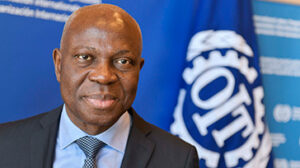Access to safe drinking water is a human right – ILO

Halfway through the Water Action Decade, billions of people are still without access to safe drinking water and sanitation, the International Labour Organisation (ILO) has observed.
However, “this year, nations have pledged to drive transformation to a water-secure world and must now urgently act on their promises,” Mr. Gilbert F. Houngbo, ILO Director-General, has stated.
In a paper titled “Protecting the Rights to Water,” obtained by the Ghana News Agency in Tema, the Director-General said safe and adequate water and sanitation were as critical as the air we breathe.
“Living without them, even temporarily, is not just dangerous and destabilizing; it is an existential threat,” he added.
In view of its critical nature, the United Nations General Assembly (UNGA) recognized the human rights to safe drinking water and sanitation in 2010 and 2015, respectively, he said.
“This action made explicit the international consensus that these rights are inextricably bound up with all other human rights—and so the objective of the entire 2030 Agenda for Sustainable Development and its 17 Sustainable Development Goals (SDGs),” he said.
Mr. Houngbo noted that the human right to water entitled everyone, without discrimination, to sufficient, safe, acceptable, physically accessible, and affordable water for personal and domestic use; this includes water for drinking, sanitation, washing, food preparation, and personal and household hygiene.
He noted that equally, the human right to sanitation entitles everyone, without discrimination, to physical and affordable access to sanitation that is safe, hygienic, secure, socially and culturally acceptable, and which provides for privacy and ensures dignity.
The ILO Director-General said there was an obligation on Member States to protect these rights, which derives from the right to an adequate standard of living and is now well established.
He, however, expressed concern that for many millions of people worldwide, Agenda 2030 remained little more than words on paper; “for them, safe drinking water and sanitation remain out of reach, and the consequences can be devastating, particularly in relation to child mortality”.
“We are now more than halfway along the timeline of Agenda 2030. Why, then, are so many people’s human rights to water and sanitation left unfulfilled? Do we stand any chance of achieving universal access to safe water and sanitation and meeting SDG 6 by the end of this decade? He said.
He therefore called for revamping efforts towards the attainment of Agenda 2030.
Source: GNA
